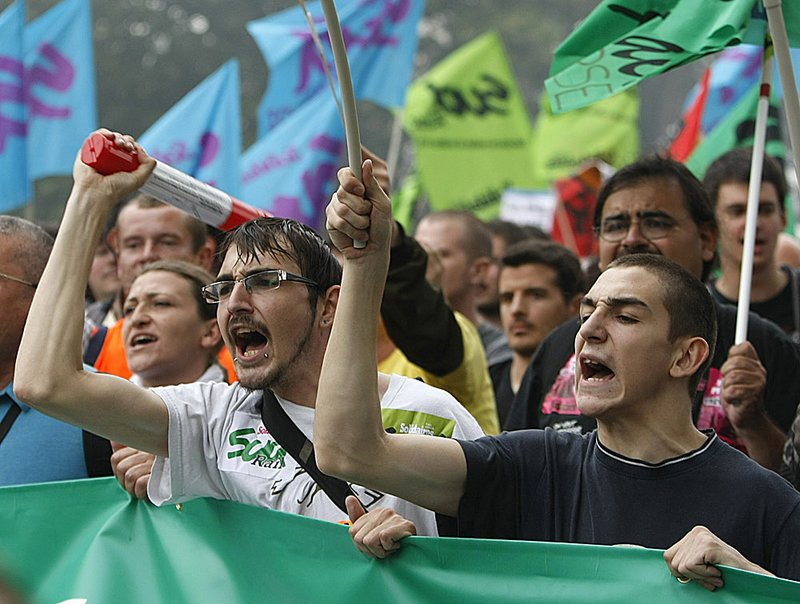PARIS — French authorities estimated nearly 1 million protesters filled the streets Thursday to try to force President Nicolas Sarkozy to drop his plan to raise the retirement age two years to 62, while strikes also disrupted airports, train stations and schools for the second time this month.
Sarkozy, like other European leaders, has struggled to convince his country of the need for cost-cutting and scaling back generous social benefits after the Greek debt crisis scared markets and sapped confidence in the entire 16-nation euro currency.
France’s powerful unions consider retirement at 60 to be a near-sacred right, and more than 230 demonstrations stretched from the southern port city of Marseille to Lille in the north. Some protesters carried signs demanding early retirement for Sarkozy.
The Interior Ministry said the protest movement had lost steam since the last day of protests Sept. 7, with 997,000 protesters in the streets Thursday, a drop of about 11 percent. But unions said the movement grew to nearly 3 million protesters, up from what they said was about 2.5 million last time.
In Paris, one protester carried a sign reading, “Austerity? For the rich first!” Vendors at the Bastille sold vuvuzelas, a new noisemaker for French demonstrators, joining the traditional megaphones and whistles.
“Today we have a pension, we deserve one, and we wish the same thing for the younger generation,” said retired police officer Michel Fourgues.
In recent days top officials have said repeatedly that the risk of a terrorist attack on French soil was at a record high, a highly unusual warning in France. But protesters seemed unworried.
“What’s the point of stirring panic, so that peoplestay home today because they’re worried the protest might be bombed?” said Micko Bourdo, a disc jockey from the Basque country, who wore a black beret and blue coveralls.
As baby boomers reach retirement age and life expectancy increases in France, the conservative government insists it must raise the retirement age so the moneylosing pension system can break even by 2018.
Sarkozy has indicated he is willing to make marginal concessions but remains firm on the central pillar: increasing the retirement age from 60 to 62 and pushing back the age for those who want full retirement benefits from 65 to 67.
Labor Minister Eric Woerth argued that the government has convinced many people of the need for change.
“If we don’t reform the retirement system then we’ll endanger the entire pension system,” he told France-2 television.
Even at 62, France wouldhave one of the lowest retirement ages in Europe. Neighboring Germany has decided to bump the retirement age from 65 to 67. The U.S. Social Security system is also gradually raising its retirement age to 67.
Sarkozy’s initiative passed a vote in the National Assembly, the lower house of Parliament, but still faces other hurdles, including a coming debate in the Senate, before becoming law.
“This is not over yet,” said Bernard Thibault, who heads the CGT labor union. His union released a statement saying the turnout required the president and Parliament “to take full account of the exasperation provoked by this law.” Unions were to meet today to decide on possible coming protests.
A demonstrator in the northern city of Lille, 48-year-old teacher Odile Deverne, said she found the pension change unfair.
“Those who will cope are those who will be able to save some money. The others will retire with nothing buthaving worked much more than before,” she said.
Walkouts disrupted travel and commutes across France, and post offices and even opera houses were hit, too. The Education Ministry said just over 25 percent of teachers went on strike.
Traffic was snarled in France’s cities, with fewer than half of the Paris Metro’s lines working normally, according to the RATP public transit network, and about half of France’s long-distance trains were canceled, according to the SNCF state-run rail system. Limited train disruptions were expected to continue today.
While the French capital’s bus lines were running almost normally, commuters on some Metro lines had to line up just to get on the platforms.
Some commuters opted out of public transit, taking their cars or using Velib, Paris’ rent-a-bike network.
Information for this article was contributed by Jenny Barchfield, Angela Charlton, Jean-Marie Godard and Oleg Cetinic of The Associated Press.
Front Section, Pages 2 on 09/24/2010
